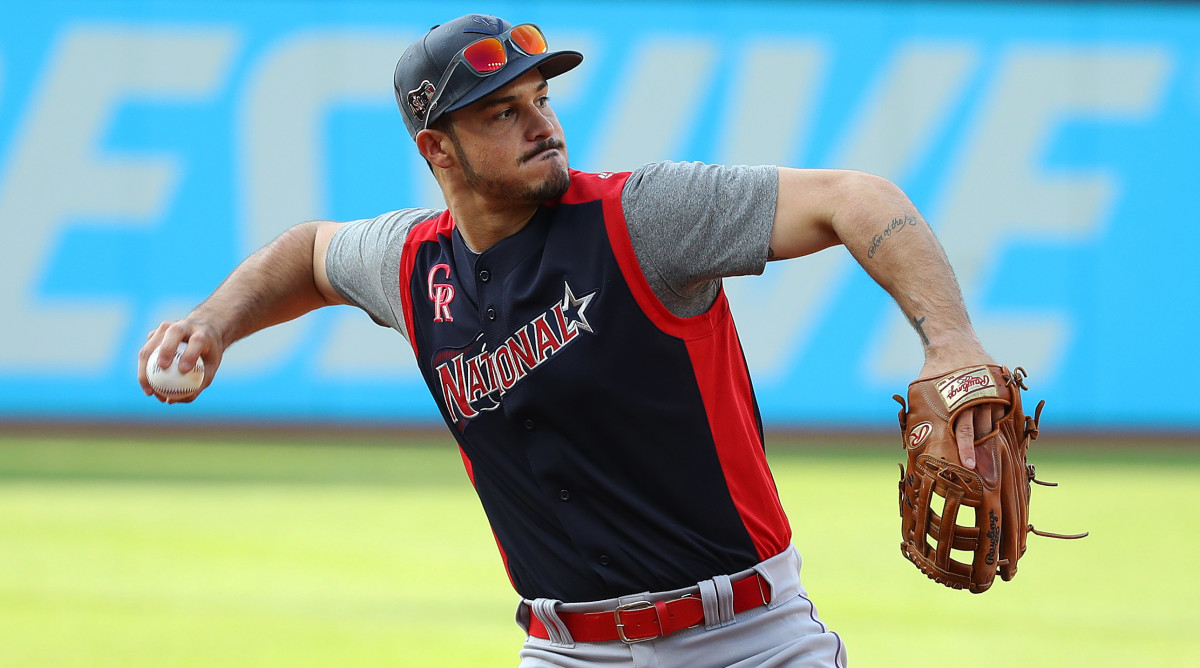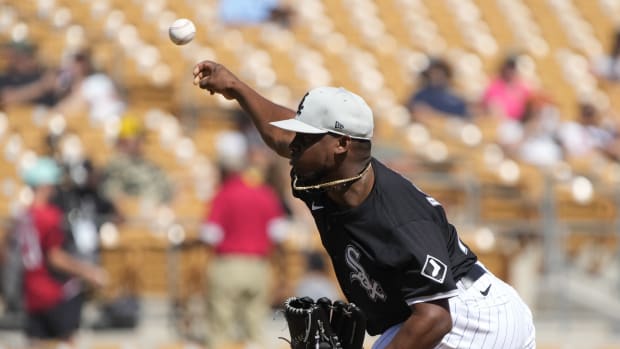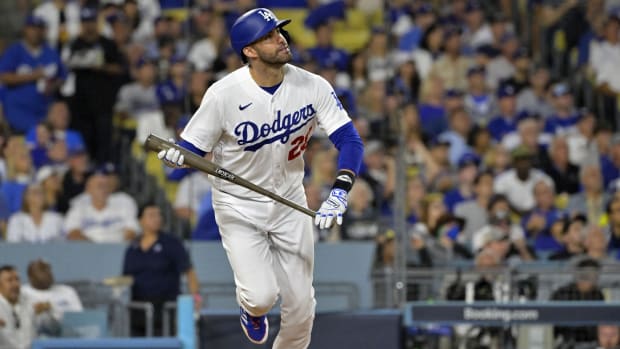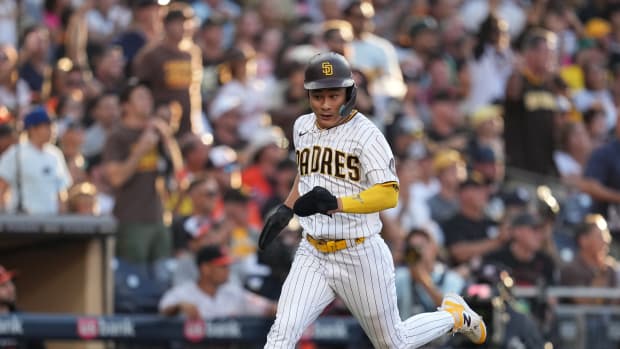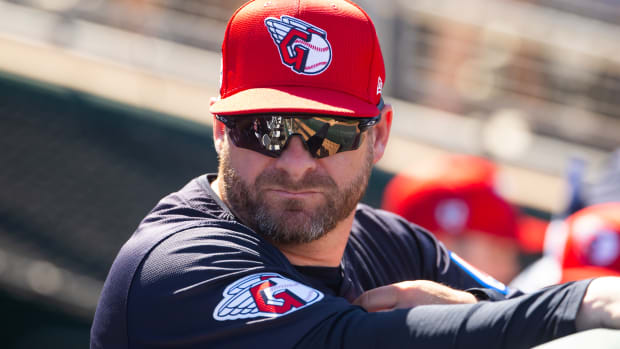Even Baseball's Best Players Are Hopelessly Overmatched in CBA Negotiations
CLEVELAND — Rockies third baseman Nolan Arenado doesn’t know when the collective-bargaining agreement between MLB and the players’ association expires. Giants reliever Will Smith doesn’t know who his team’s union representative is. Cubs shortstop Javier Báez says he has never heard of the CBA. These are the best players in the world, selected to represent their sport at this week’s All-Star Game, and they are hopelessly overmatched.
Whether players know it or not, their future is at stake: The current CBA runs out in December 2021, and negotiations are expected to get so complicated that, for the first time in the 53-year history of the union, they have begun two years ahead of time. The owners want to keep things as they are. The players want change. Of some kind. They think.
Posed two questions at Tuesday’s media availability—what are your priorities heading into discussions, and what would you give up to get what you want—players responded with little consensus. That’s when they responded at all.
“I don’t know,” said Rangers DH Hunter Pence. “I feel like that’s above my pay grade.”
"That’s a question for a union rep, not me,” said Astros reliever Ryan Pressly. “I really don’t know.”
“I’d have to do hours of research to educate myself on the topic before I go out there and make any claims,” said Rays second baseman Brandon Lowe.
“We have people to do all that,” said Rangers lefty Mike Minor. “We hired people to tell them, This is what we want. I don’t really know what we’re negotiating about. We have people who, that’s their job title, to help us. I’m not even a player rep. You’re asking me a lot of questions.”
White Sox righty Lucas Giolito is a player representative. But he doesn’t know what he wants, either. “I think I’d need a refresher course,” he said. “It hasn’t really been on my mind.”
That’s a problem, because the players are already operating at a disadvantage. Their major victories in the last CBA, negotiated in December 2016, were four extra off-days and two seats per player on buses in spring training. The owners walked away with a punitive luxury tax that amounts to a soft salary cap, and a hard cap on signings of international amateurs. The result has been an upending of the game’s economic structure. The system in which players earn the league minimum for three years or so, then go to salary arbitration for another three, then finally get life-changing money in free agency—that system no longer works. Teams no longer believe players peak in their 30s, so they are wary of paying free agents for past production. Gone are the days when a 36-year-old fourth outfielder could get two years and $20 million. Now he is lucky to receive a minor-league deal with an invitation to spring training.
“I think we have unknowingly conceded a lot,” said Rays righty Charlie Morton. “Maybe not unknowingly. Maybe that’s the wrong word. You can read the CBA. You can know what’s in there. When you hear it, it sounds nice. And then three years later, you’re like, What did we just do? And now everybody’s pretty upset.”
This is not a fair fight. Players association head Tony Clark oversees 750 constituents who are aggrieved and cannot agree on why. Commissioner Rob Manfred is responsible for 30 ownership groups whose interests are simple and largely aligned: Make and keep as much money as possible.
The players wonder if those interests are perhaps too aligned. Before Tuesday’s All-Star Game, Clark danced around the word collusion, saying only that teams’ offers to free agents seemed “coordinated.” He is either misrepresenting or misreading the situation. It is hard to imagine that the Pirates call the Blue Jays and ask them to help suppress salaries. The much more likely scenario is that Pittsburgh GM Neal Huntington and Toronto VP of baseball operations Ben Cherington, who both graduated from Amherst College, are working with comparable data. As teams turn increasingly to facts over feelings in team building, they assign similar values to players. And the math here is clear: It makes more sense to lean on young, cheap talent than to tie yourself to a massive free-agent deal.
Just look around Cleveland: Teams spent $1.8 billion in free agency this offseason. Not even 10% of that outlay is represented on All-Star rosters this week. On Feb. 21, third baseman Manny Machado signed with the Padres for the richest free-agent deal in American sports history: $300 million over 10 years. Seven days later, rightfielder Bryce Harper and the Phillies topped him, with $330 million over 13 seasons. Neither is here this week. In fact, none of the nine most expensive free agents of last offseason is at Progressive Field. Instead the sport is featuring a dozen players making around the league minimum of $555,000.
The GMs are right. It makes no sense to treat free agency like they once did. Even players can see that.
“The teams have a right to not pay guys as they’re getting older,” said Dodgers lefty Clayton Kershaw. “The problem with that is that baseball’s always been a sport where you get underpaid on the way in and overpaid on the way out—not to the real world, but relatively speaking. So if that’s not going to happen anymore, then we’ve gotta figure out a way to get these younger guys paid during their prime years.”
Sure. But what would you give up?
Most players seemed surprised by the question. A few recommended trading pace-of-play initiatives, such as a pitch clock or a three-batter minimum, for one fewer year of club control. (This offer would be worthless: The league can unilaterally institute rules changes whenever it wants.) Some even used the words the union abhors more than any other: salary cap. But even there they are divided. “There will be no cap,” said Nationals righty Max Scherzer. And some threw around the idea of a work stoppage.
“It’s tough, because we feel like we shouldn’t have to give up anything,” said Giolito. “We should be paid for what we’re doing.”
That is, of course, not how negotiating works. But their stance toward the CBA mirrors their stance toward the league’s salary structure: Because they got a raw deal early, they would like things to go their way now.






























